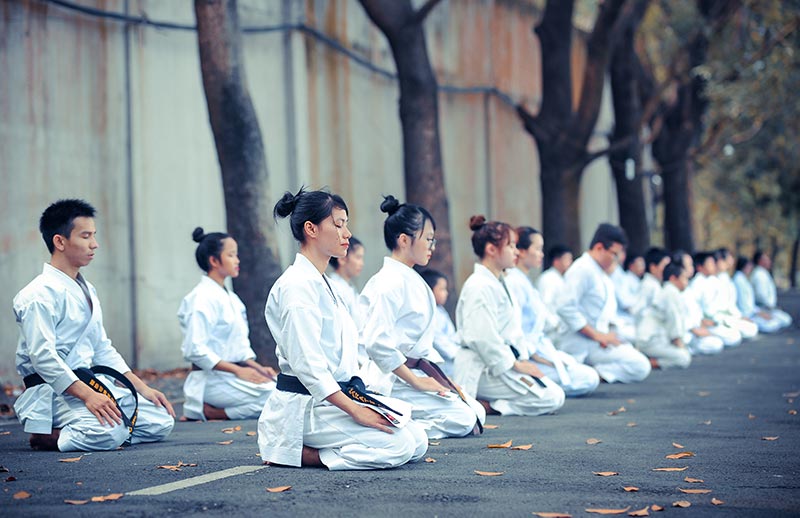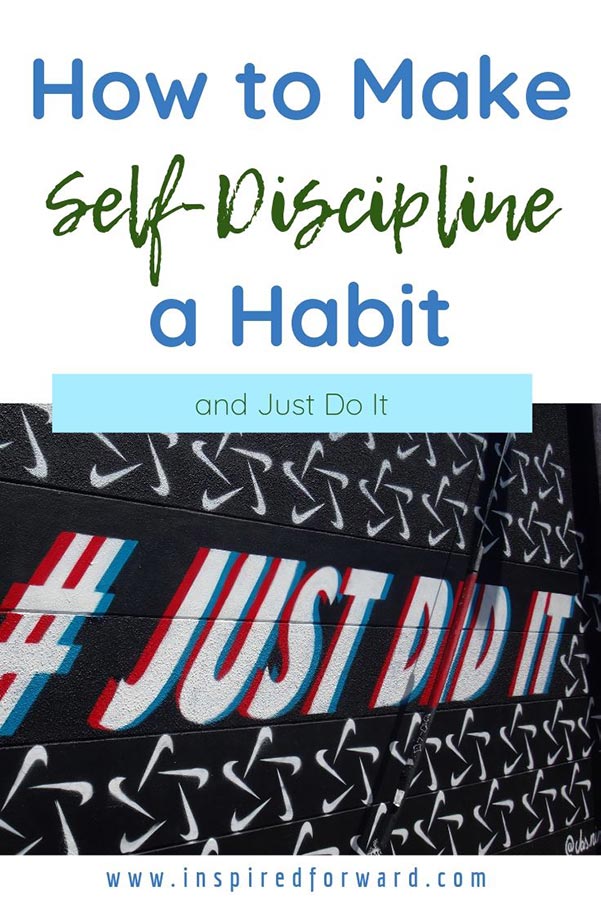Inspired Forward is an Amazon Affiliate partner.
In the world of self-help, self-improvement, personal growth, self-development—whatever you want to call it—an important concept lives there. It’s the concept of self-discipline.

What is Self-Discipline?
Self-discipline is “the ability to control one’s feelings and overcome one’s weaknesses; the ability to pursue what one thinks is right despite temptations to abandon it.” (Thanks, Google Dictionary.)
Dwell on that definition for a good, solid minute.
There’s a lot to unpack there.
Control one’s feelings. Most people think that feelings happen to them. They just spring up or someone else causes them in us. “He makes me angry.” The truth is that everyone is in control of and responsible for their own feelings. Giving that control away is a lack of self-discipline.
Overcome one’s weaknesses. Everyone is strong and weak in certain areas. I don’t consider myself a good public speaker, which is why I’m taking steps to change that. The Clifton StrengthsFinder assessment does a great job showing your top strengths—and by extension, where you’re weak.
Pursue what one thinks is right. What’s right for one person is not right for others. I consider this different from “absolute truth” and people who think personal opinion is a “personal truth.” Starting a business might be right for you, but not for someone else.
Despite temptations to abandon it. That’s the rub, isn’t it? Self-discipline means staying on the path even when shiny objects pop up, distractions abound, and apathy creeps in.
How is it Different from Motivation and Willpower?
Without self-discipline, success is impossible. Period. —Lou Holtz
Self-discipline is a level all its own. Motivation and willpower certainly serve specific purposes, but we should never rely solely on either one of them to keep us moving towards success.
So, what is motivation?
The definition we’re looking at says this: “the general desire or willingness of someone to do something.”
Pretty vague, right? “General desire or willingness.” I have a general desire to do a lot of things. Does that mean I’m motivated to do them? No, not exactly.
The true value of motivation is that motivation equals motion, which gives us momentum.
Why can’t we rely on motivation?
Motivation is more flighty than a hummingbird. The motivation to work out in the morning doesn’t last through the alarm waking you up. Motivation to start on that big project fizzles when you open your email to hundreds of new messages and a voicemail from your boss. It’s difficult to stay motivated when you can’t motivate yourself on command.
Well, what about willpower?
Sheer willpower gets a lot of things done, but willpower is a finite resource. We wake up with a “bank” of willpower, and every decision makes a withdrawal. Over time, there’s no more willpower. The bank is empty.
This is why you order takeout when you get home instead of cooking a healthy meal, or get into a fight with your partner over something stupid that you immediately regret.
Motivation doesn’t stick around, and willpower doesn’t last all day.

Why Discipline Matters
“We do today what they won’t, so tomorrow we can accomplish what they can’t.” – Dwayne ‘The Rock’ Johnson
Those without self-discipline find themselves falling behind. They keep trying to harness willpower and motivation without any luck.
The Rock has a point.
Discipline means we’re willing to do the hard work now, knowing it reaps benefits down the line. Self-discipline matters because it’s the only way to guarantee that future you is a better version of who you are now.
With self-discipline, we build habits. We take negotiation out of the picture. Habits and commitments don’t empty the willpower bank, and we don’t need motivation to execute on decisions made with self-discipline.
We just do it.
Make It a Habit
It takes self-discipline to build habits And, like most things, it takes practice to build self-discipline. It’s easiest to start small with a new habit or replacing an old habit.
Habits can take anywhere from a few days to months or even years to develop and “stick.” People like saying it takes three weeks because anyone can do something new for 21 days. James Clear says that it takes, on average, 66 days for a habit to form, but it could be as fast as a few days or as long as a year.
If you go with the 21-day shtick, keep in mind that the real change and challenge comes after those first 21 or 30 days.
These are the best books I’ve read on habits:
- Better Than Before, by Gretchen Rubin
- The Power of Habit, by Charles Duhigg
- Atomic Habits, by James Clear
While you’re working on these new habits, every time you feel like you don’t want to do it—do it anyway. You undermine your progress and your integrity when you give in to the desire to let it go “just this once.”
What you do every day is more important than what you do once in a while.
The most successful people are the ones who do a little bit every day.
Know Thyself
No piece of advice is universal. Waking up at 4 AM works for me, but not for my husband. I’m a lark, and he’s a night owl. Knowing yourself is a key to understanding what you need to do to build self-discipline.
Something I love saying is that I don’t expect you to follow my advice to the letter. I expect you to read it, think about it, poke it a little, and try it out—with the understanding that if some part of it doesn’t work for you, to put that piece back and move on.
Take what works and leave the rest.
Here’s a list of things that I am:
- Upholder, leaning towards obliger: I meet inner and outer expectations, but outer expectations are often easier to meet. Find out your Tendency here.
- Lark: I rise and retire early. My most productive and creative hours are in the morning.
- Overbuyer: I’ll buy new running shoes instead of using my old sneakers. If you drop me in a bookstore, I’ll come home with six books I haven’t read and three hardcover replacements for paperbacks already on our shelf.
- Minimalist: I need things neat, clean, and orderly. Everything has its place, like goes with like, but we don’t need a lot of things. This contrasts with my overbuyer tendency.
- To better define “overbuyer + minimalist”: I’m a simplicity lover with some abundance traits. I’d rather buy a clean podcasting setup instead of trying to hack it with my headphones and compromise sound quality.
- Opener: I prefer starting projects and opening things to finishing projects or emptying/finishing things.
- Familiarity: I like the familiar, but I’m also not afraid to try new things (unless it’s haggis. I won’t touch haggis with a 20-foot caber.)
- Small steps: I prefer taking small steps towards my goals than big, massive movement that some people enjoy.
I encourage you to think about what you know about yourself.
Be Willing to Change What You Don’t Like
“We must all suffer one of two things: the pain of discipline or the pain of regret and disappointment.” – Jim Rohn
We all dislike certain things in our lives, environments, and circumstances. I approach everything I dislike with the reminder in the back of my brain that the only thing I can control is myself.
We’re fools if we think we can control other people, events, or anything that is not ourselves.
Oftentimes we’re faced with undesirable situations and circumstances that we wish we could change. We wish that person wouldn’t act like such a jerk, or this friend would call you more.
Remember—you control you.
You can’t control others.
So what do you do when you’re facing something you don’t like?
When I say “be willing to change what you don’t like,” I’m really saying “be willing to change yourself and your reactions to things you don’t like.”
There’s a huge difference between these two thoughts:
- The person who cut me off in traffic is an asshole!
- Everyone’s late at some point. I’m going to let this person in and hope he gets wherever he needs to go with enough time to spare.
Self-discipline keeps you from descending into the negativity of the first thought.
The willingness to change what we don’t like—either about ourselves or how we react to the world—marks a level of self-awareness many people don’t achieve.

Subtract the Temptations
One of the best ways to foster self-discipline and keep good habits is to remove the temptations and triggers holding you back. If you know you’ll eat chocolate with reckless abandon, don’t keep it in the house.
Part of “Know Thyself” is knowing the things you need to subtract from your life.
I needed to subtract phone games, so I deleted all of them from my phone—including Pokémon Go, which I’d played daily for three years since its release in 2016. I finally understood the cost those games had on my attention and my overall mental well-being.
Give it some thought—what could you subtract to improve your self-discipline?
Check Your Mindset
Quick question—do you think you can learn something new, or do you think you’re pretty much stuck where you are?
These thoughts indicate a fixed mindset:
- “I can’t do this”
- “I’ll never learn how to do [hard thing]”
- “I’ve tried before but I failed, so therefore I can’t do it”
On the other hand, these thoughts indicate a growth mindset:
- “I can learn how to do this even though it’s hard or confusing right now”
- “Learning new things makes me feel excited”
- “The real destination is the journey itself”
How you think about things defines what you’ll do as a result.

Take Extreme Ownership
Extreme ownership is the idea that you take full responsibility for everything in your world, even if you don’t think it’s “your fault.”
Passing the buck and blaming other people show weakness of character. When you step up to the plate and say “I’m responsible for this, and I’m going to fix it,” it shows people that you’re self-disciplined and have integrity.
Think about someone you know who never takes the blame, even when it’s their fault. We all know that person. Maybe they can’t hold on to a relationship and never blame the only common denominator (themselves). Maybe they don’t take responsibility for their shortcomings at work—blaming coworkers or circumstances instead of owning up to mistakes.
How do you feel about that person? You’d never want to be on the same team or even in the same room with them, would you?
So why do we think we can do the same? Taking extreme ownership over our lives actually brings more freedom than most people think. Nobody wants to give more responsibility to the person who blames others for their mistakes.
Self-discipline and extreme ownership are bosom-brothers. It takes dedication and practice to take extreme ownership over anything, let alone your entire life. But it’s worth it.
Don’t Beat Yourself Up
The last thing to remember is this: Don’t beat yourself up when you make mistakes or your commitment wavers.
Fall down seven times, stand up eight. —Japanese Proverb
No matter how many times you “fail” (which is just your First Attempt In Learning), picking yourself up to continue the work is how you build true self-discipline.
Winners never quit, and the only way to lose is to stop trying.
I encourage you to share your own self-discipline stories in the comments. Learning from others is a great way to get new ideas!

What an epic post! Thanks so much for sharing all these practical tips. I also loved the book The Power of Habits. Right up there with James Clear’s book Atomic Habits. ?